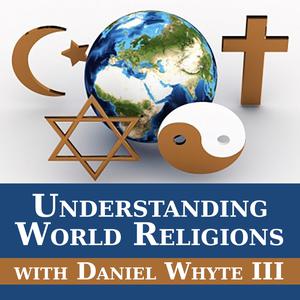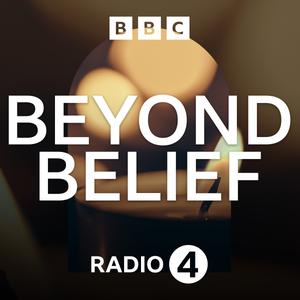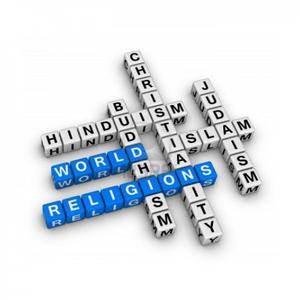
Understanding World Religions
Daniel Whyte III
Learn everything you need to know about the world's major (and some minor) religions.
- 21 minutes 52 secondsTranscendental Meditation
Our quote for today is from Karl Menninger. He said, “It is doubtless true that religion has been the world's psychiatrist throughout the centuries.”
In this our last podcast, we are completing our journey through Garry R. Morgan's book, "Understanding World Religions in 15 Minutes a Day."
Our Understanding World Religions topic for today is, "Transcendental Meditation"
Transcendental Meditation, popularly known as TM, typically would be considered a New Age religion. For its size and popularity, it will be covered in a brief chapter of its own.
The movement and related organizations were founded by Maharishi Mahesh Yogi. He was born in northern India in 1917 (some sources say 1911, others 1918) and earned a university degree in physics before renouncing worldly pursuits to become a disciple of Swa-mi Brah-ma-nan-da Sa-ra-swa-ti, better known as Guru Dev. Following Guru Dev’s death in 1953, Maharishi (a Hindi title meaning “great seer”) continued to meditate and reflect, including two years spent in a Himalayan cave. These meditations on Guru Dev’s teachings became the basis for TM.
Ma-ha-ri-shi Mahesh Yogi moved to the U.S. in 1958 and founded the Spiritual Regeneration Movement in Los Angeles. Although the initial response was small, the antiestablishment mood of American youth in the later 1960s produced an interested audience for his message of peace and tranquility. The Beatles began to follow him, even spending time at his ashram (meditation and training center) in India, and this publicity brought rapid growth. After a few years, there was a falling-out with the Beatles, especially John Lennon, who called Ma-ha-ri-shi “a lecherous womanizer.” (George Harrison continued to practice Hinduism; his former estate outside London is now a Hindu temple and retreat center.) The adverse publicity brought a decline in numbers, and in the early 1970s Maharishi returned to India.
...
7 August 2016, 5:03 pm - 20 minutes 40 secondsNew Age Religions
Our quote for today is from Edwin Lewis. He said, "A religion without the element of mystery would not be a religion at all."
In this podcast, we are making our way through Garry R. Morgan's book, "Understanding World Religions in 15 Minutes a Day."
Our Understanding World Religions topic for today is, "New Age Religions"
New Age is an umbrella term for a host of recent religious startups, most originating since 1970. The name comes from the expected dawning of a new age of human consciousness and development, often referred to as the Age of Aquarius from its connection to astrology. Although not original with her, Marilyn Ferguson’s The Aquarian Conspiracy, considered by many the “bible” of New Age religions, did much to popularize the term.
There is no New Age “central headquarters” or mother organization. Most have developed independently of (sometimes in competition with) other, similar movements. They now exist in a vast network of autonomous groups held together by a few common beliefs.
New Age religions exhibit a wide variety of organizational variation as well. There are New Age churches with clergy, buildings, and regular services. Some practices, on the other hand, while based on the same core beliefs as other New Age faiths, may not seem connected to any particular organized religion at all. The use of crystals for physical healing and emotional improvement is one example. New Age books number in the thousands, and New Age bookstores everywhere in the West also offer products of many kinds to aid people in their quest for fulfillment. Shirley MacLaine’s autobiographical works on reincarnation and other New Age topics have sold in the multimillions.
...
29 July 2016, 5:47 am - 20 minutes 42 secondsNeopagan Religions
Our quote for today is from George Washington. He said, “Of all the dispositions and habits which lead to political prosperity, religion and morality are indispensable supports.”
In this podcast, we are making our way through Garry R. Morgan's book, "Understanding World Religions in 15 Minutes a Day."
Our Understanding World Religions topic for today is, "Neopagan Religions"
"The Goddess is alive and magic is afoot." Thus proclaimed an I-694 billboard in a Minneapolis suburb a few years ago, sponsored by the Goddess Committee, Northern Dawn Council, Covenant of the Goddess. The growth of Neopagan religions in North America and Europe has been one of the most significant expressions of new religious movements since 1950. Many today use the word pagan to refer to nonreligious people or those whose behavior is considered unacceptable, but Pagan actually is an umbrella term for the ancient religions of pre-Christian Europe. These did not cease to exist after most Europeans converted, at least nominally, to Christianity, but they did go underground and were often viewed with suspicion, as they frequently are today. Neopagan religions are a revival and repackaging of these belief systems with some contemporary additions.
Wicca is the best known of this large family of contemporary religious movements, though there are many different groups. Druidism, Celtic religions, As-a-tru, the Green Circle, and the Circle of Awen are a handful of the many examples. The variety makes generalizing difficult, but a few themes do characterize most.
...
22 July 2016, 4:00 pm - 20 minutes 17 secondsJehovah's Witnesses
Our quote for today is from Theodore Roosevelt. He said, “Wide differences of opinion in matters of religious, political, and social belief must exist if conscience and intellect alike are not to be stunted, if there is to be room for healthy growth.”
In this podcast, we are making our way through Garry R. Morgan's book, "Understanding World Religions in 15 Minutes a Day."
Our Understanding World Religions topic for today is, "Jehovah’s Witnesses"
Jehovah’s Witnesses are well known for the door-to-door pairs who encourage people to join Bible studies and purchase Watchtower literature. They have produced more than thirty billion pieces of literature and spend over a billion hours annually distributing it. The Watchtower magazine is published in nearly two hundred languages and has a worldwide circulation that more than doubles that of Reader’s Digest.
Jehovah’s Witness theology is based on the writings of Charles Taze Russell, who, influenced by certain Adventist preachers as to the second coming of Christ, founded the Zion’s Watch Tower and Herald of Christ’s Presence magazine in 1879. He wrote articles teaching that Christ had returned invisibly in 1874 and would establish God’s visible kingdom in 1914. Soon after, he established Zion’s Watch Tower Tract Society, the forerunner of the current Watchtower Bible and Tract Society. As they do today, Russell’s followers sold books, magazines, and other literature door to door.
...
15 July 2016, 4:00 pm - 22 minutes 8 secondsMormonism
Our quote for today is from Ronald Reagan. He said: "The frustrating thing is that those who are attacking religion claim they are doing it in the name of tolerance, freedom and openmindedness. Question: Isn’t the real truth that they are intolerant of religion? They refuse to tolerate its importance in our lives."
In this podcast, we are making our way through Garry R. Morgan's book, "Understanding World Religions in 15 Minutes a Day."
Our Understanding World Religions topic for today is, "Mormonism."
The Church of Jesus Christ of Latter-day Saints, often called the Mormon (or LDS) Church, is probably the best known and undoubtedly the largest of the religious movements begun since 1800. Since 1950, it has doubled in size every fifteen years, and in 2010, claimed fourteen million members worldwide, with over half that membership outside the U.S. Much of its growth is attributable to its missionary program: Tens of thousands of clean-shaven, white-shirt-and-tie-clad young men give two years of their life, at their own or their family's expense, to spread the LDS Church's message globally. In an average twenty-four-month stint a missionary converts five people to the Mormon faith.
Once found mainly in Utah, Mormons now live in all fifty states and nearly every nation. Formerly despised, on the fringe of society, Mormons have become a mainstream group. They head large corporations like Marriott and Albertsons and are elected as representatives and senators. Their strong family values help them find acceptance in almost every neighborhood. Many Americans, including some members of the LDS Church, assume they're another Christian denomination. But their actual teaching contradicts Christianity on a number of key points. Mormon use of Christian terms, with different meanings, causes and spreads confusion.
...
7 July 2016, 4:00 pm - 20 minutes 22 secondsChristian Science and ScientologyOur quote for today is an old Negro proverb: “Education without Salvation equals damnation.” In this podcast, we are making our way through Garry R. Morgan's book, "Understanding World Religions in 15 Minutes a Day." Our Understanding World Religions topic for today is, "Christian Science and Scientology" Once again, we'll look at different faith systems with similar names in one episode, since sometimes these also are confused with each other. The Church of Christ, Scientist is the official name of a movement (founded in 1879 by Mary Baker Eddy) commonly referred to as Christian Science. The name is well known through the Christian Science Monitor, a respected newspaper, and through Christian Science Reading Rooms in major cities around the U.S. and in other countries. Christian Scientists claim to be one of Christianity's denominations, with a faith based on the Bible. Indeed, their literature and official website contain frequent scriptural quotations, usually from the King James Version. Their interpretations, however, and their answers to ultimate questions, show a belief system substantially different from orthodox Christianity of any branch or denomination. ... Scientology, widely known for the celebrities among its members, was started by L. Ron Hubbard in 1955. A moderately successful science-fiction author, Hubbard said, in 1949, "Writing for a penny a word is ridiculous. If a man really wants to make a million dollars, the best way would be to start his own religion." Using his 1950 bestseller "Dianetics: The Modern Science of Mental Health" as a foundation, that's exactly what he did. ...26 June 2016, 12:36 am
- 19 minutes 14 secondsThe Unitarian-Universalist Association, The Unity School of Christianity, and The Unification Church
Our quote for today is from Elizabeth Gilbert. She said, "Look for God. Look for God like a man with his head on fire looks for water."
In this podcast, we are making our way through Garry R. Morgan's book, "Understanding World Religions in 15 Minutes a Day."
Our Understanding World Religions topic for today is, "The Unitarian-Universalist Association, The Unity School of Christianity, and The Unification Church"
These three belief systems are considered in one episode not because they are necessarily similar in belief but because the similarity of their names sometimes has led to confusion. We'll look at each separately.
--- The Unitarian-Universalist Association
The Unitarian-Universalist Association formed from the 1959 merger of the Unitarian Church and Universalism, which, historically, developed separately. Unitarian beliefs have roots in the anti-Trinitarian controversies of Christianity's early centuries but came into their present form during the Enlightenment. Unitarianism found greatest growth and popularity in the U.S., particularly through the speaking and writing of the nineteenth-century essayist Ralph Waldo Emerson. In contrast to orthodox Christian teaching, Unitarians follow the ethics of Jesus but deny his divinity. They believe the apostle Paul was the one who intentionally elevated Jesus' standing—that Jesus himself was strictly human and knew it. Unitarianism was and remains popular chiefly with the intelligentsia.
...
--- The Unity School of Christianity
Charles and Myrtle Fillmore founded The Unity School of Christianity in 1889. Charles was interested in Eastern religions and the occult. Myrtle, his wife, was a follower of Christian Science; this mix came together in Unity.
Although Unity makes extensive use of biblical vocabulary, its basic belief system is more like Hinduism. God is the source of everything but is not distinct from the human soul. As with Christian Science, Jesus was only human; Christ was just the spiritual aspect of him. "Jesus was potentially perfect and He expressed that perfection; we are potentially perfect and we have not expressed it," according to Unity writings. The focus is on health, spiritual healing, and prosperity. All of us have Christ potential within us. The goal of Unity is to replace the physical human body with a true spiritual body through a series of reincarnations, so that everyone becomes a Christ.
...
--- The Unification Church
The Rev. Sun Myung Moon founded The Unification Church, in 1954, as The Holy Spirit Association for the Unification of World Christianity. Its followers, commonly called "Moonies," currently number about ten thousand in the U.S., though there were more at Unification's peak in the 1980s. Moon was born in 1920 in what is now part of North Korea, and later moved to South Korea. In 1972, he moved to the U.S., where he lived until recently reclaiming South Korea as his primary residence.
...
12 December 2015, 3:51 am - 17 minutes 32 secondsCults, 'Isms,' and Contemporary Religious Movements
Our quote for today is from Ravi Zacharias. He said, "My premise is that the popular aphorism that 'all religions are fundamentally the same and only superficially different' simply is not true. It is more correct to say that all religions are, at best, superficially similar but fundamentally different."
In this podcast, we are making our way through Garry R. Morgan's book, "Understanding World Religions in 15 Minutes a Day."
Our Understanding World Religions topic for today is, "Cults, 'Isms,' and Contemporary Religious Movements"
In the last few episodes of this podcast, we will deal with belief systems not typically categorized as world religions, even though some of them are global in nature and have many millions of followers. The number of adherents to Mormonism (The Church of Jesus Christ of Latter-day Saints), for instance, far exceeds the number of adherents to Judaism, Jainism, or Baha'i, and Mormons are in nearly every country though usually categorized as a cult. Conversely, Sikhism is small in numbers and followed by just one ethnic group (though it has spread somewhat through migration), but is nearly always found in books on world religions. How do we distinguish a cult from a religion?
At the outset, we must know there is no "Central Board of Religions" that decides what "gets in" and what doesn't. Some books include Baha'i and some don't. Some books on contemporary religious movements include it as well, just as most would include the Nation of Islam.
By our working definition, all these are religions—organized sets of beliefs that answer ultimate questions. So how does one end up as a religion and another as a contemporary religious movement? Some criteria does help distinguish one from another. A few belief systems are rather obviously one or the other. With some we might make the case either way.
...
3 December 2015, 9:07 pm - 19 minutes 36 secondsSecular Humanism
Our quote for today is from Simone Weil. He said, "Humanism was not wrong in thinking that truth, beauty, liberty, and equality are of infinite value, but in thinking that man can get them for himself without grace."
In this podcast, we are making our way through Garry R. Morgan's book, "Understanding World Religions in 15 Minutes a Day."
Our Understanding World Religions topic for today is, "Secular Humanism"
Secular Humanism is not merely nontheistic. It is zealously antitheistic. Secular Humanists hold that belief in God is the greatest danger humanity faces, and human "salvation" requires total elimination of belief in the supernatural.
So why include it in a book on world religions? Secular Humanism fits our working definition of religion as an organized system of beliefs that answers ultimate questions about life. It has councils and associations, conferences and workshops, and a statement of beliefs. As we've seen, many belief systems are not based on belief in or reliance on the supernatural. Theravada Buddhism, Jainism, and Confucianism, for instance, believe the answers come from within, not from any source beyond humanity. The inclusion of Secular Humanism is consistent, and besides, it would be strange to ignore a belief system that has the stated goal of eradicating the beliefs and practices described in every other chapter of this book.
Secular Humanism's foundation is built on the philosophy of naturalism, or materialism: that the material universe (the natural world) is all that exists. This it shares with atheism, the belief that there is sufficient evidence to deny the existence of God and the supernatural. Agnostics, those who say there is insufficient evidence to know whether God (or the supernatural) exists, may also embrace Secular Humanism. But for Secular Humanists, atheism is just a beginning point. They have developed a complete worldview and value system built on naturalistic presuppositions.
As an organized system it differs from secularism, a much broader term referring to the worldview of those who live as if God does not exist. This includes all the nonreligious, estimated by researcher David Barrett to exceed 20 percent of earth's population. Certainly, Secular Humanism influences secular beliefs, but it goes beyond passively ignoring God to actively building a lifestyle and worldview based on opposition to belief in God.
26 November 2015, 3:55 am - 20 minutes 31 secondsShinto
Our quote for today is from Yukitaka Yamamoto. He said, "To be fully alive is to have an aesthetic perception of life because a major part of the world's goodness lies in its often unspeakable beauty."
In this podcast, we are making our way through Garry R. Morgan's book, "Understanding World Religions in 15 Minutes a Day."
Our Understanding World Religions topic for today is, "Shinto"
Shinto, Japan's traditional religion, combines animistic aspects with ancestor veneration. There are shrines, priests, and corporate ceremonies, but much of Shinto is practiced in the home. It has no founder or starting date and has been practiced in Japan since before recorded history. It is so imbedded in the culture that it didn't even have a name until the arrival of Confucianism, Buddhism, and Taoism from China in about AD 400, when it was called Shinto to distinguish it from the other systems. The name comes from the Chinese words "shen" and "tao," meaning "the way of the gods." The Japanese name, "kami no mi chi," means the same.
Although "kami" is usually rendered "gods," it has a much broader meaning in the Japanese mind. It refers not only to major deities like the Sun Goddess but also to lesser deities, spirits of ancestors, even a spiritual presence in trees or hills. Basically, anything possessing a form of spiritual power or influence fits into the category. The Japanese estimate there are eight million kami.
Shinto also has nationalistic aspects. Its mythology explains the origins of the Sun Goddess (Amaterasu), the creation of Japan and the rest of the world, and how the Japanese emperors descended from Amaterasu, which is why they were believed by the Japanese to have divine status. In the 1930s, the military manipulated these traditions to justify the invasion of China and the attack on Pearl Harbor in 1941.
...
18 November 2015, 5:00 pm - 19 minutes 4 secondsTaoism
Our quote for today is from Lao Tzu [LAH-O-ZAH]. He said, "In dwelling, live close to the ground. In thinking, keep to the simple. In conflict, be fair and generous. In governing, don't try to control. In work, do what you enjoy. In family life, be completely present."
In this podcast, we are making our way through Garry R. Morgan's book, "Understanding World Religions in 15 Minutes a Day."
Our Understanding World Religions topic for today is, "Taoism"
Because Taoism and Confucianism are so opposite in philosophy and concept, they're commonly treated as separate religions. Also, combining them would result in a very lengthy chapter, so the usual custom has been followed here. This is somewhat artificial, however, since Chinese religion as it is actually practiced combines these along with ancient polytheistic religions, including ancestor veneration and Buddhism. This is a community religion, and a traditional temple in Taiwan or rural China frequently contains statues of Confucius, Lao-tzu, Buddha, and many traditional deities all together.
Taoism takes its name from the title of the book "Tao Te Ching," or "The Way of Nature." In modern slang we might call this philosophy "It is what it is." This brief work—its length is about the same as five chapters of this book—rivals the "Analects of Confucius" as the most influential literature in Chinese history. Only the Bible has been translated more times than the Tao Te Ching, and more than a thousand commentaries have been written about it.
The man traditionally credited with having written it and with starting Taoism was named Li-poh-yang, but he is better known by the title given him by his disciples, Lao-tzu, meaning "Old Master." In China, where age is highly revered, this title of respect even gave rise to a legend that he was born old. There is less historical information about Lao-tzu than any other founder of a world religion. Some scholars even doubt that this historical person ever existed. Confucian sources say he was born about 500 BC, and that the two shapers of Chinese life met in person. Many literary scholars believe the Tao Te Ching was compiled from multiple sources over several centuries.
12 November 2015, 3:47 am - More Episodes? Get the App
Your feedback is valuable to us. Should you encounter any bugs, glitches, lack of functionality or other problems, please email us on [email protected] or join Moon.FM Telegram Group where you can talk directly to the dev team who are happy to answer any queries.
 Radiolab
Radiolab
 Beyond Belief
Beyond Belief
 World Religions
World Religions